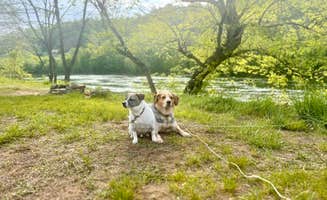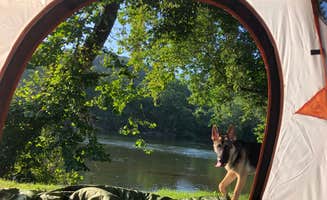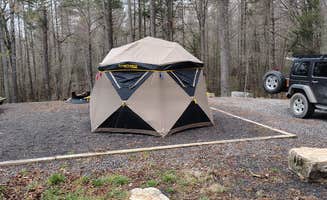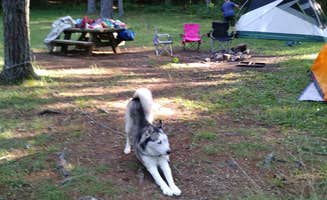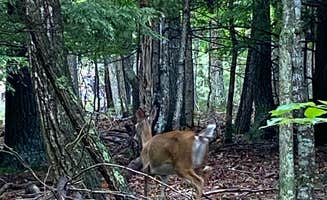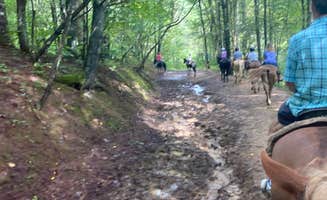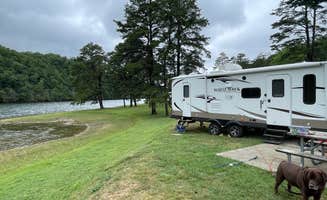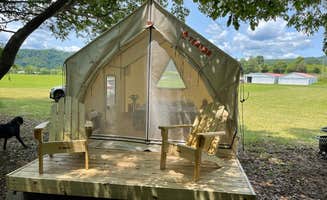Pembroke, Virginia camping sites stretch along the New River Valley where elevations range from 1,700-2,500 feet, creating distinct microclimates across camping areas. Free dispersed sites at higher elevations typically run 5-10 degrees cooler than riverfront campgrounds during summer months. Most campgrounds maintain accessibility from April through October with limited winter options.
What to do
Kayaking and tubing routes: The New River offers multiple access points for water recreation. At New River Junction Campground, "The river is beautiful. Great views of the mountain sides. I was able to catch a small-mouth bass pretty quickly and missed a few others," according to one camper who enjoyed fishing directly from the campsite.
Hiking trail networks: Extensive connected trails link several camping areas. "Plenty of hiking trails in the park (roughly 5 miles worth). Trails are wide and seemingly cleared of leaves...new trail signage and tree placards abound, as new benches strategically located near lake views," notes a visitor to Claytor Lake State Park Campground.
Mountain biking access: Several trails allow cycling directly from campsites. "The big plus...you can MTB the trails!" mentions a Claytor Lake visitor, making it convenient for campers bringing bikes.
What campers like
Clean bathroom facilities: Despite rural settings, many campgrounds maintain quality facilities. At Claytor Lake State Park, "The bathrooms and shower facilities were clean and convenient to our campsite. The campsite was large and quiet which was nice. It felt somewhat private because of the trees and design of the site."
Waterfront camping options: Multiple sites offer direct river or lake access. A visitor at Eggleston Springs Campground found "Such a great stay! We booked a campsite last minute with this campground and we couldn't have been happier. The campsite was great! Right up against the river with beautiful mountain back drop."
Availability of firewood: Many campgrounds sell firewood directly on-site. "Wood, ice and soda machines available. IT's my favorite go-to campground!" mentioned one Claytor Lake visitor, which eliminates the need to source firewood elsewhere.
What you should know
Train noise considerations: Several riverfront campgrounds experience regular train noise. "THE TRAINS: HOLY HELL. The trains alone are reason enough not to camp here. Especially with a tent. Five trains between midnight and 5am. Every one of them blew the horn well past the crossing," warns a New River Junction camper.
Seasonal flooding impacts: Spring flooding can affect site conditions. At Whitt Riverbend Park, "Primitive camping but has plenty of natural wonders to keep you busy!" notes a camper who also mentioned checking conditions after heavy rains.
Water access challenges: Some riverfront sites have difficult water approaches. "The river is rocky and slippery so it's dangerous and not very family friendly. Especially for young children and older people," reports a visitor at New River Junction.
Tips for camping with families
Group site availability: Some locations offer dedicated group camping areas. At Boley Field Group Campground, "There's a fire pit, picnic table, outdoor grill, and latrines. I've camped there both in groups and solo. It's secluded in the National Forest, but still really close to civilization."
Pet-friendly trail systems: Many locations accommodate dog hiking. At Kairos Wilderness Resort, "It sits on 1500 acres and has 41+ miles of trails," making it perfect for families with pets who need space to explore.
Ranger programs for kids: Some parks offer organized activities. At Claytor Lake State Park, a visitor mentioned, "We hiked, played at the lake and attended the roving ranger talks. Our camp hosts were great at keeping us informed and sharing ideas to make the weekend fun."
Tips from RVers
Site size considerations: Many campgrounds have specific site limitations. At Claytor Lake State Park, "Sites 11 and 12 have more privacy space," but another camper noted, "A little tight for big rigs" about certain other sites.
Water and electric access: Available hookups vary widely between campgrounds. "My site had electric and water hook ups," reports a camper at Claytor Lake, but those wanting full hookups should verify before booking as many sites offer only partial connections.
Road access challenges: Some campgrounds require navigating difficult terrain. "I'd recommend a vehicle with decent ground clearance since you have to cross a creek and some medium sized rocks to get there," advises a camper about Boley Field Group Campground.


